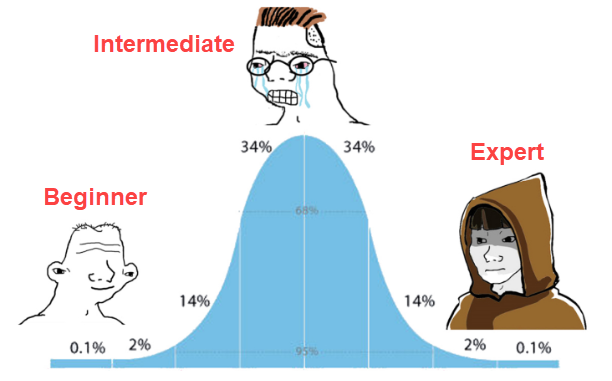“Double, double toil and trouble,” is a line repeated by the witches in Macbeth as they lay out the ominous prophecies of greatness and dire consequences for the titular character. Macbeth’s ambition envisions a perfect ending though desperate actions and moral weakness ruin it. So too are the misguided actions in pursuit of perfection which can set expectations and pressure that lead to unwanted results.
The Tantalizing Idea of Perfection
Most of us love the concept of perfection. The idea that something out there can be perfect is comforting – the perfect diamond with the perfect wedding. We search for perfection in the world with symmetry, circles, triangles, and the golden ratio. Maybe you still try to stop the gas pump on a round number when you fill your car.
As a designer in my early career, I sought perfection. The dimensions in the design would be perfectly round numbers. The typography would be perfectly kerned, with hanging punctuation, and the proper quote marks and dashes! I’ve ruined my family members who now share the same disdain for sub-par designs we see. But honestly, no one else cares. Even many designers overlook the same nuances.
I remember hearing the story of a watchmaker known for exceptional craftsmanship. He would inscribe the smallest of gears with the words, “God is in the details.” This was seen by almost no one, left only as a testament to his meticulous nature. I had once admired this story – whether true or not.
A Perfectionist’s Agony
As we see in Macbeth, a desire for such perfect outcomes can turn sour. One can become so focused on perfection that the vision can’t be realized. If it is attainable, the cost may be too high.
An author, artist, or musician who endlessly adjusts their work and is never satisfied to release it to the world. It becomes a mental block where the vision is likely impossible to achieve.
There is always more to do and more that can be done. Perfection is a moving target, and the pursuit can be an endless endeavor.
Destructive Perfection
Much like Macbeth’s ambition leading to his downfall, a perfectionist can suffer the same fate if the pursuit gets in the way of the goal.
Apologies to Shakespeare for making a comparison between Macbeth (1606) and a goofy modern comedy, but I think it’s fitting here. I love the diner scene in the movie Tommy Boy (1995) with Chris Farley. Tommy is the main character who is trying to become a great salesman. In this scene, Tommy describes how he inevitably ruins his perfect sale. He destroys his chance of closing the deal because he loves the idea of the sale too much.
Here at Perficient, we do a lot of digital and web work, and the same can play out in this industry. I’ve seen groups focused so heavily on earning perfect scores from scanning tools like Google PageSpeed Insights, GTmetrix, Siteimprove, or other validation services. Someone on the client team wants to arrive at perfect front-end performance, accessibility, or security marks. Any site you put into these tools will fall short of a perfect score. The effort devoted to trying may prevent other improvements from being made.
Not Perfect Enough
That’s not to say we shouldn’t ever strive to be better. Of course we should!
You may be familiar with the frequently shared idea around 99.9%. Two million documents will be lost by the IRS each year if 99.9% is good enough. Over a thousand phone calls will be incorrectly routed every minute, and twelve babies will be given to the wrong parents each day. I have no idea if these numbers are accurate, but you get the idea.
There is a time and place where the goal is near perfection. Risk, regulation, and legal compliance, for instance, need to be near perfect. But in all cases, there should be checks and balances to make sure that the pursuit is justified. Does the level of effort make sense? Is the juice worth the squeeze?
The Happy Medium
We want to encourage healthy ambition but not let it become a destructive obsession. With the pursuit of perfection, you do not want to cause more harm than good.
Are there times when something can be perfectly imperfect? I think so.
There is a popular meme format that describes the cycle of a beginner, an intermediate-level professional, and an expert. The joke is that a beginner will be naïve and not understand something important that an intermediate-level person obsesses over. But as one becomes an expert, they realize the obsession wasn’t that important.

Conclusion
“Out, out brief candle! Life’s but a walking shadow…” is the line where Macbeth realizes the futility and limited extent of his achievements. Is the long path worth the result? Could the results be as sweet and sometimes attained more quickly if we let up on perfection just a little bit? Yes.
Facebook once publicly stated that they “move fast and break things.” But with more scrutiny around regulations, they’ve stopped saying that. There is a time and a place for both. Find your perfectly imperfect zone of success and ensure that you spend time where it makes sense (consider the Eisenhower Quadrants of Productivity).
……
If you are looking for a perfect fit for your next project, reach out to your Perficient account manager or use our contact form to begin a conversation.
<HcK 1337>

